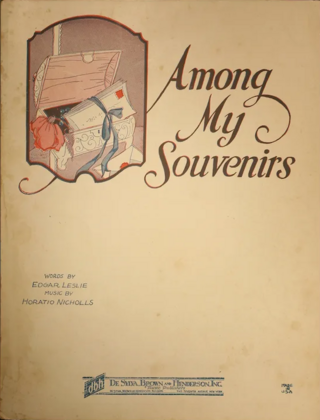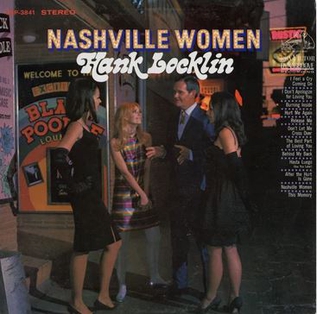"Blue Moon" is a popular song written by Richard Rodgers and Lorenz Hart in 1934 that has become a standard ballad. Early recordings included those by Connee Boswell and by Al Bowlly in 1935. The song was a hit twice in 1949, with successful recordings in the U.S. by Billy Eckstine and Mel Tormé.
"'A' You're Adorable" is a popular song with music by Sid Lippman and lyrics by Buddy Kaye and Fred Wise, published in 1948.
"Buttons and Bows" is a popular song with music written by Jay Livingston and lyrics by Ray Evans. The song was published on February 25, 1948 by Famous Music Corp., New York. The song was written for and appeared in the Bob Hope and Jane Russell film The Paleface and won the Academy Award for Best Original Song. It was originally written with an Indian theme, but was changed when the director said that would not work in the movie. It was a vocal selection on many radio programs in late 1948. It was reprised in the sequel, Son of Paleface, by Roy Rogers, Jane Russell and Bob Hope. In 2004 it finished #87 in AFI's 100 Years...100 Songs survey of the top tunes in American cinema.
"Be My Life's Companion" is a popular song. It was written by Bob Hilliard (lyricist) and Milton De Lugg (composer) and published in 1951.
"Dear Hearts and Gentle People" is a popular song published in 1949 with music by Sammy Fain and lyrics by Bob Hilliard. The song refers to the singer's hometown, and different versions allude to a range of U.S. states.
"Chattanoogie Shoe Shine Boy" is a popular song written by Harry Stone and Jack Stapp and published in 1950. It is the signature song of Red Foley who recorded it in late 1949. The song has been covered by many artists, including Bing Crosby, Frank Sinatra, and Faron Young who scored a hit with the song in 1959.
"Mule Train" is a popular song written by Johnny Lange, Hy Heath, Ramblin' Tommy Scott and Fred Glickman. It is a cowboy song, with the singer filling the role of an Old West wagon driver, spurring on his team of mules pulling a delivery wagon. As he goes about his work, the driver mentions the various mail-order goods he is delivering to far-flung customers. "Mule Train" was originally recorded by Ellis "Buz" Butler Jr. in 1947. Butler was the original writer of the song along with Fred Glickman. The original recording was released by Buz Butler on Decca Records.
"April in Portugal" is a popular song, also named "The Whisp'ring Serenade." The music was written by Raul Ferrão with Portuguese lyrics by José Galhardo as a fado named "Coimbra", about the city of that name in 1947. English lyrics written by Jimmy Kennedy were set to the music, though many of the most popular versions of the song were instrumentals. It is one of the signature songs of Portuguese singer and fadista Amália Rodrigues. It was also recorded in French by the tenor Luís Piçarra.

"Red Roses for a Blue Lady" is a 1948 popular song by Sid Tepper and Roy C. Bennett. It has been recorded by a number of performers. Actor-singer John Laurenz (1909–1958) was the first to record the song for Mercury Records. It rose to #2 on the weekly “Your Hit Parade” radio survey in the spring of 1949. The original 78rpm single was issued on Mercury 5201 - Red Roses For A Blue Lady by John Laurenz.
"I Said My Pajamas (and Put On My Pray'rs)" is a popular song with music by George Wyle and lyrics by Edward Pola. It was published in 1949. The song describes somebody who is in love, but whose descriptions about what she does are full of switcheroos, indicating her absentmindedness.
"(Now and Then There's) A Fool Such as I" is a popular song written by Bill Trader and published in 1952. Recorded as a single by Hank Snow it peaked at number four on the US country charts early in 1953.
"Powder Your Face with Sunshine" is a popular song written by Carmen Lombardo and Stanley Rochinski, and published in 1948. Rochinski wrote the lyrics for "Powder Your Face with Sunshine" while hospitalized due to spinal injuries incurred during World War II. Subsequently, he brought the lyrics to Lombardo who set it to music.
"That's My Desire" is a 1931 popular song with music by Helmy Kresa and lyrics by Carroll Loveday.
"Someday You'll Want Me to Want You" is a popular song published in 1944 by Jimmie Hodges. The song became a standard, recorded by many pop and country music singers.

"You Must Have Been a Beautiful Baby" is a popular song with music by Harry Warren and lyrics by Johnny Mercer, written in 1938 for the Warner Brothers movie Hard to Get, released November 1938, in which it was sung by Dick Powell.

"Among My Souvenirs" is a 1927 song with words by Edgar Leslie and music by Horatio Nicholls.
"She Called Me Baby" is a country song written in 1961 by Harlan Howard.

"There Won't Be Anymore" is a song written and recorded by Charlie Rich. Recorded in the 1960s, it was released as a single at the end of 1973, and was his fourth No. 1 hit on the Billboard Hot Country Singles chart in March 1974, and a top 20 pop hit as well.

The singles discography of Elvis Presley began in 1954 with the release of his first commercial single, "That's All Right". Following his regional success with Sun Records, Presley was signed to RCA Victor on November 20, 1955. Presley's first single with RCA, "Heartbreak Hotel", was a worldwide hit, reaching the No. 1 position in four countries and the top 10 in many other countries. Other hit singles from the 1950s include "Don't Be Cruel", "Hound Dog", "Love Me Tender", "Too Much", "All Shook Up", "(Let Me Be Your) Teddy Bear", "Jailhouse Rock", "Don't", "Hard Headed Woman" and "A Big Hunk o' Love". On March 24, 1958, Presley entered the United States Army at Memphis, Tennessee, and was stationed in Germany. He left active duty on March 5, 1960.

Nashville Women is a studio album by American country singer–songwriter Hank Locklin. It was released in August 1967 via RCA Victor Records and was produced by Chet Atkins. Nashville Women was Locklin's sixteenth studio recording and contained 12 tracks. Three of the album's tracks were singles that became minor hits on the country chart in 1967. The album itself would also chart following its release. Nashville Women would receive positive reviews from critics and music publications.






